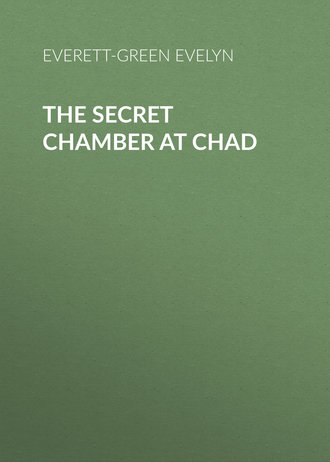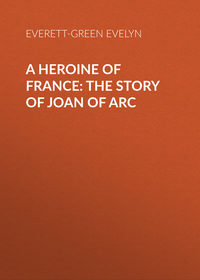 полная версия
полная версияThe Secret Chamber at Chad
"Ay. And from my heart do I thank thee for thy kindness, young sir; and gladly will I show thee in return the trick of yon chamber. If thou canst kindle a torch it will light us better, for the way thither is wondrous tortuous and narrow."
Bertram had a little lantern-a very treasured possession of his-and after the usual tedious process of lighting had been gone through, he softly led the way back to the sleeping chamber. With his own hands he undid the fastening of the door and saw it swing open, and then the two passed through into a very narrow aperture, which proved to be a long narrow gallery contrived in the thickness of the wall, which would only just admit of the passage of one figure at a time.
As they went in they drew to the door, and the fugitive showed his young companion how the bolt upon the inner side might be unloosed.
"It is easy enow in the light, but hard to feel in the black darkness," he remarked; and then they pursued their devious way on and on through this strange passage, which wound up and down and in and out, and landed them at last at the foot of a spiral staircase, so narrow and squeezed in by masonry as to be barely serviceable for the purpose for which it was contrived. It led them to a small door, through which they passed, to find themselves in a room of fair size but very low, and without any window, which seemed to occupy (as indeed it did) a portion of the house between two of the other floors, and was so contrived as to absolutely defy detection be the examination of the structure of the house never so exhaustive. If the secret door were not found, nothing else would ever betray this cunning hiding-place. Doubtless that was why, during the many changes that had prevailed at Chad during the past fifty years, the knowledge of its very existence had been lost.
"Air comes in freely through many cracks and slits," explained the prisoner. "It is not an unpleasant place save in the heat of the middle day, when it becomes like a veritable oven. That is why my thirst was so unbearable. There is a bed, as thou seest, and a chair and a few other things. One could be comfortable here were it not for starvation and thirst."
"I will feed thee so long as thou remainest hid," cried the boy, with generous ardour. "Thou shalt hide there by day, and by night shalt wander abroad an thou wilt, to breathe the air and stretch thy limbs. My brothers and I will be thy friends. Thou needst fear nothing now. We will find out when it is safe for thee to leave thy retreat, and then thou shalt go forth without fear; or, if thou likest it better, thou shalt abide here till our father returns and take service with him. I doubt not he would be glad enow to number a Warbel again amongst his trusty servants."
The man's face lighted up wonderfully.
"If he would do that," he cried eagerly, "I should have no wish for anything better. But my master, the baron-"
"My father fears not the baron!" answered the boy proudly; "and, besides, his young kinsman is not dead. We heard something of his side of the tale, and the youth is not even like to die now. My father could protect thee from his wrath. Stay here, and thou wilt have naught to fear."
The fugitive took the lad's hand and pressed it to his lips.
"I will serve thee for ever and ever for this boon," he answered; and Bertram went back to his room, to lie awake and muse over what had befallen till the dawn broke and his brothers awoke to the new day.
To keep any secret from his two brothers was a thing impossible to Bertram, and before they had finished dressing that morning, Edred and Julian were both made aware of the strange adventure of the night previous. Looking up to Bertram, as they both did, as the embodiment of prowess and courage, they did not grudge him his wonderful discovery, but they were eager to visit the fugitive themselves, and to carry him food and drink.
The days that followed were days of absolute enchantment to the boys, who delighted in waiting on Warbel and passing hours in his company. He told them entrancing stories of adventure and peril. He was devoted to his three youthful keepers, and wished for nothing better than to enter service with their father.
Later on, when all hue and cry after the missing man was over, and when Lord Mortimer's young kinsman was so far recovered that it would be impossible to summon Warbel for any injury inflicted on him, Bertram conducted him to the hut of one of his father's woodmen, who promised to keep him safe till the return of the knight.
When Sir Oliver came back, Warbel was brought to him, told a part of his tale, and was admitted readily as a member of the household; but the story of his incarceration in the secret chamber remained a secret known only to himself and the three boys. So delightful a mystery as the existence of this unknown chamber was too precious to be parted with; and it was a compact between the boys and the man, who now became their chief attendant and body servant, that the trick of that door and the existence of that chamber were to be told to none, but kept as absolutely their own property.
Chapter II: The Household At Chad
The office of mistress of a large household in the sixteenth century was no sinecure. It was not the fashion then to depute to the hands of underlings the supervision of the details of domestic management; and though the lady of the Hall might later in the day entertain royalty itself, the early hours of the morning were spent in careful and busy scrutiny of kitchen, pantry, and store or still room, and her own fair hands knew much of the actual skill which was required in the preparation of the many compounds which graced the board at dinner or supper.
Lady Chadgrove was no exception to the general rule of careful household managers; and whilst her lord and master went hunting or hawking in the fresh morning air, or shut himself up in his library to examine into the accounts his steward laid before him or concern himself with some state business that might have been placed in his hands, she was almost always to be found in the offices of the house, looking well after the domestic details of household management, and seeing that each servant and scullion was doing the work appointed with steadiness and industry.
There was need for some such careful supervision of the daily routine, for the large houses in the kingdom were mainly dependent upon their own efforts for the necessaries of life throughout the year. In towns there were shops where provisions could be readily bought, but no such institution as that of country shops had been dreamed of as yet. The lord of the manor killed his own meat, baked his own bread, grew his own wheat, and ground his own flour. He had his own brewery within the precinct of the great courtyard, where vast quantities of mead and ale were brewed, cider and other lighter drinks made, and even some sorts of simple home-grown wines. Chad boasted its own "vineyard," where grapes flourished in abundance, and ripened in the autumn as they will not do now.
Nothing, perhaps, shows more clearly the change that has passed upon our climate by slow degrees than a study of the parish records of ancient days. Vineyards were common enough in England some hundreds of years ago, and wine was made from the produce as regularly as the season came round. Then there were the simpler fruit wines from gooseberries, currants, and elderberries, to say nothing of cowslip wine and other light beverages which it was the pride of the mistress to contrive and to excel in the making. Our forefathers, though they knew nothing of the luxuries of tea and coffee, were by no means addicted to the drinking of water. Considering the sanitary conditions in which they lived in those days, and the fearful contamination of water which frequently prevailed, and which doubtless had much to do with the spread of the Black Death and other like visitations, this was no doubt an advantage. Still there were drawbacks to the habit of constant quaffing of fermented drinks at all hours of the day, and it was often a difficult matter to keep in check the sin of drunkenness that prevailed amongst all classes of the people.
At Chad the gentle influence of the lady of the manor had done much to make this household an improvement on many of its neighbours. Although there was always abundance of good things and a liberal hospitality to strangers of all sorts, it was not often that any unseemly roistering disturbed the inmates of Chad. The servants and retainers looked up to their master and mistress with loyalty and devotion, curbed their animal passions and wilder moods out of love and reverence for them, and grew more civilized and cultivated almost without knowing it, until the wild orgies which often disgraced the followings of the country nobility were almost unknown here.
Possibly another humanizing and restraining influence that acted silently upon the household was the presence of a young monk, who had been brought not long since from a neighbouring monastery, to act in the capacity of chaplain to the household and tutor to the boys, now fast growing towards man's estate. There was a beautiful little chapel connected with Chad. It had fallen something into neglect and ruin during the days of the civil wars, and had been battered about in some of the struggles that had raged round Chad. But Sir Oliver had spent both money and loving care in restoring and beautifying the little place, and now the daily mass was said there by Brother Emmanuel, and the members of the household were encouraged to attend as often as their duties would permit. The brother, too, would go about amongst the people and talk with them as they pursued their tasks, and not one even of the rudest and roughest but would feel the better for the kindly and beneficent influence of the youthful ecclesiastic.
Brother Emmanuel had one of those keenly intelligent and versatile minds that are always craving a wider knowledge, and think no knowledge, even of the humblest, beneath notice. He would ask the poorest wood cutter to instruct him in the handling of his tool or in the simple mysteries of his craft as humbly as though he were asking instruction from one of the learned of the land. No information, no occupation came amiss to him. He saw in all toil a dignity and a power, and he strove to impress upon every worker, of whatever craft he might be, that to do his day's work with all his might and with the best powers at his command was in truth one excellent way of serving God, and more effectual than any number of Paters and Aves said whilst idling away the time that should be given to his master's service.
Such teaching might not be strictly orthodox from a monkish standpoint, but it commended itself to the understanding and the approval of simple folks; and the brother was none the less beloved and respected that his talk and his teaching did not follow the cut-and-dried rules of his order. Sir Oliver and his wife thought excellently of the young man, and to the boys he was friend as well as tutor.
On this hot midsummer day the mistress of Chad was making her usual morning round of the kitchens and adjoining offices-her simple though graceful morning robe, and the plain coif covering her hair, showing that she was not yet dressed for the duties which would engross her later in the day. She had a great bunch of keys dangling at her girdle, and her tablets were in her hands, where from time to time she jotted down some brief note to be entered later in those household books which she kept herself with scrupulous care, so that every season she knew exactly how many gallons or hogsheads of mead or wine had been brewed, what had been the yield of every crop in the garden or meadow, what stores of conserves had been made from each fruit as its season came in, and whether that quantity had proved sufficient for the year's consumption.
The cherry crop was being gathered in today. Huge baskets of the delicious fruit were ranged along one wall of the still room, and busy hands were already preparing the bright berries for the preserving pan or the rows of jars that were likewise placed in readiness to receive them. The cherry trees of Chad were famous for their splendid crop, and the mistress had many wonderful recipes and preparations by which the fruit was preserved and made into all manner of dainty conserves that delighted all who partook of them.
"I will come anon, and help you with your task," said the lady to the busy wenches in the still room, who were hard at work preparing the fruit. "I will return as soon as I have made my round, and see that all is going well."
The girls smiled, and dropped their rustic courtesies. Some amongst them were not the regular serving maids of the place, but were the daughters of the humbler retainers living round and about, who were glad to come to assist at the great house when there was any press of work-a thing that frequently happened from April to November.
None who assisted at Chad at such times ever went away empty handed. Besides the small wage given for the work done, there was always a basket of fruit, or a piece of meat, or a flagon of wine, according to the nature of the task, set aside for each assistant who did not dwell beneath the roof of Chad. And if there was sickness in any cottage from which a worker came, there was certain to be some little delicacy put into a basket by the hands of the mistress, and sent with a kindly word of goodwill and sympathy to the sufferer.
It was small wonder, then, that the household and community of Chad was a happy and peaceable one, or that the knight and his lady were beloved of all around.
The morning's round was no sinecure, even though the mistress was today as quick as possible in her visit of inspection. Three fat bucks had been brought in from the forest yester-eve, when the knight and his sons had returned from hunting. The venison had to be prepared, and a part of it dried and salted down for winter use; whilst of course a great batch of pies and pasties must be put in hand, so that the most should be made of the meat whilst it was still fresh.
When that matter had been settled, there were the live creatures to visit-the calves in their stalls, the rows of milch kine, and the great piggery, where porkers of every kind and colour were tumbling about in great excitement awaiting their morning meal. The mistress of the house generally saw the pigs fed each day, to insure their having food proper to them, and not the offal and foul remnants that idle servants loved to give and they to eat were not some supervision exercised. The care of dogs and horses the lady left to her husband and sons, but the cows, the pigs, and the poultry she always looked after herself.
Her daily task accomplished, she returned to the still room, prepared for a long morning over her conserves. It was but half-past nine now; for the breakfast hour in baronial houses was seven all the year round, and today had been half-an-hour earlier on account of the press of work incident to the harvesting of the cherry crop. Several of the servants who were generally occupied about the house had risen today with the lark, to be able to help their lady, and soon a busy, silent party was working in pantry and still room under the careful eye of the mistress.
One old woman who had been accommodated with a chair, though her fingers were as brisk as any of the younger girls', from time to time addressed a question or a remark to her lady, which was always kindly answered. She was the old nurse of Chad, having been nurse to Sir Oliver in his infancy, and having since had charge of his three boys during their earliest years. She was growing infirm now, and seldom left her own little room in a sunny corner of the big house, where her meals were taken her by one of the younger maids. But in the warm weather, when her stiff limbs gained a little more power, she loved on occasion to come forth and take a share in the life of the house, and work with the busy wenches under the mistress's eye at the piles of fruit from the successive summer and autumn crops as they came in rotation.
"And where be the dear children?" she asked once; "I have not set eyes on them the livelong day. Methought the very smell of the cherries would have brought them hither, as bees and wasps to a honey pot."
The lady smiled slightly.
"I doubt not they will be here anon; but doubtless they have paid many visits to the trees ere the store was garnered. I think they are in the tilt yard with Warbel. It is there they are generally to be found in the early hours of the day."
"They be fine, gamesome lads," said the old woman fondly-"chips of the old block, true Chads every one of them;" for the custom with the common people was to call the lord of the manor by the name of his house rather than by his own patronymic, and Sir Oliver was commonly spoken of as "Chad" by his retainers; a custom which lingered long in the south and west of the country.
"They are well-grown, hearty boys," answered the mother quietly, though there was a light of tender pride in her eyes. "Bertram is almost a man in looks, though he is scarce seventeen yet. Seventeen! How time flies! It seems but yesterday since he was a little boy standing at my knee to say his light tasks, and walking to and fro holding his father's hand. Well, Heaven be praised, the years have been peaceful and prosperous, else would not they have fled by so swiftly."
"Heaven be praised indeed!" echoed the old woman. "For now the master is so safely seated at Chad that he would be a bold man who tried to oust him. But in days gone by I have sorely feared yon proud Lord of Mortimer. Methought he would try to do him a mischief. His spleen and spite, as all men say, are very great."
The lady's face clouded slightly, but her reply was quiet and calm.
"I fear me they are that still; but he lacks all cause of offence. My good lord is careful in all things to avoid making ill blood with a jealous neighbour. That he has always cast covetous eyes upon Chad is known throughout the countryside; but I trow he would find it something difficult to make good any claim."
"Why, verily!" cried the nurse, with energy. "He could but come as a foul usurper, against whom would every honest hand be raised. But, good my mistress, what is the truth of the whisper I have heard that the Lord of Mortimer has wed his daughter to one who calls himself of the house of Chad? I cannot believe that any of the old race would mate with a Mortimer. Is it but the idle gossip of the ignorant? or what truth is there in it?"
"I scarce know myself the rights of the matter," answered Lady Chadgrove, still with a slight cloud upon her brow. "It is certainly true that Lord Mortimer has lately wed his only child, a daughter, to a knight who calls himself Sir Edward Chadwell, and makes claim to be descended from my lord's house. Men say that he makes great boasting that the Chadwells are an older branch than the Chadgroves, and that by right of inheritance Chad is his.
"Methinks he would find it very hard to make good any such claim. Belike it is but idle boasting. Yet it may be that there will be some trouble in store. He has taken up his abode at Mortimer's Keep, and maybe we shall hear ill news before long."
All eyes were fixed for a moment on the lady's face, and then the hands moved faster than before, whilst a subdued murmur went round the group. Not one heart was there that did not beat with indignation at the thought that any should dare to try to disturb the peace of the rightful lord of Chad. If the loyalty and affection of all around would prove a safeguard, the knight need have no fear from the claims advanced by any adversary.
"There has been a muttering of coming tempest anent those vexed forest rights," continued the lady, in reply to some indignant words from the nurse. "I would that difficult question could be settled and laid at rest; but my good lord has yielded something too much already for the sake of peace and quietness, and at each concession Mortimer's word was passed that he would claim no further rights over the portion that remained to us. But his word is broken without scruple, and we cannot ever be giving way. Were no stand to be made, the whole forest track would soon be claimed by Mortimer, and we should have nothing but the bare park that is fenced about and cannot be filched bit by bit away. But all the world knows that Chad has forest rights equal to those of Mortimer. It is but to seek a quarrel that the baron continues to push his claims ever nearer and nearer our walls."
Another murmur of indignation went round; but there was no time for further talk, as at that moment the three boys entered from the tilt yard; hot, thirsty, and breathless, and the fair-haired lad with the dreamy blue eyes held a kerchief to his head that was stained with blood.
"Art hurt, Edred?" asked the mother, looking up.
"'Tis but a scratch," answered the boy. "I am not quite a match for Bertram yet; but I will be anon. I must learn to be quicker in my defence. Thanks, gentle mother; belike it will be better for it to be bound up. It bleeds rather too fast for comfort, but thy hands will soon stop that."
The other boys fell upon the fruit with right good will, whilst the mother led her second son to the small pump nigh at hand, and bathed and dressed the rather ugly wound in his head.
Neither mother nor son thought anything of the hurt. It was easy enough to give and receive hard blows in the tilt yard, and bruises and cuts were looked upon as part of the discipline of life.
As soon as the dressing was over, Edred joined his brothers, and did his share in diminishing the pile of luscious fruit. And as they ate they chattered away to the old woman of their prowess in tilt yard and forest, relating how Bertram had slain a fat buck with his own hands the previous day, and how they had between them given the coup-de-grace to another, which had been brought to bay at the water, father and huntsmen standing aloof to let the boys show their strength and skill.
Nine years had passed since that strange night when Bertram had been awakened by the advent of the mysterious stranger at his bedside. He had developed since then from a sturdy little boy into a fine-grown youth of seventeen, who had in his own eyes, and in the eyes of many others, well-nigh reached man's estate; and who would, if need should arise, go forth equipped for war to fight the king's battles. He was a handsome, dark-haired, dark-eyed youth, with plenty of determination and force of character, and with a love of Chad so deeply rooted in his nature, that to be the heir of that property seemed to him the finest position in all the world, and he would not have exchanged it for that of Prince of Wales.
The second son, Edred (Ethelred was his true name; he was called after his mother, Etheldred), was some half-head shorter than his brother, but a fine boy for all that. He was fifteen, and whilst sharing to a great extent in the love of sport and of warlike games so common in that day, he was also a greater lover of books than his brothers, and would sometimes absent himself from their pastimes to study with Brother Emmanuel and learn from him many things that were not written in books. The other lads gave more time to study than was usual at that period; for both Sir Oliver and his lady believed in the value of book lore and the use of the pen, deploring the lack of learning that had prevailed during the confusion of the late wars, and greatly desiring its revival. But it was Edred who really inherited the scholarly tastes of his parents, and already the question of making a monk of him was under serious discussion. The boy thought that if he might have a few more years of liberty and enjoyment he should like the life of the cloister well.
Julian bore a strong resemblance to Bertram both in person and disposition. He was a very fine boy, nearly fourteen years old, and had been the companion of his brothers from infancy, so that he often appeared older than his age. All three brothers were bound together in bonds of more than wonted affection. They not only shared their sports and studies, but held almost all their belongings in common. Each lad had his own horse and his own weapons, whilst Edred had one or two books over which he claimed absolute possession; but for the rest, they enjoyed all properties in common, and it had hardly entered into their calculations that they could ever be separated, save when the idea of making Edred into a monk came under discussion; and as that would not be done for some years, it scarcely seemed worth troubling over now. Perhaps things would turn out differently in the end, and they would remain together at Chad for the whole of their natural lives.









